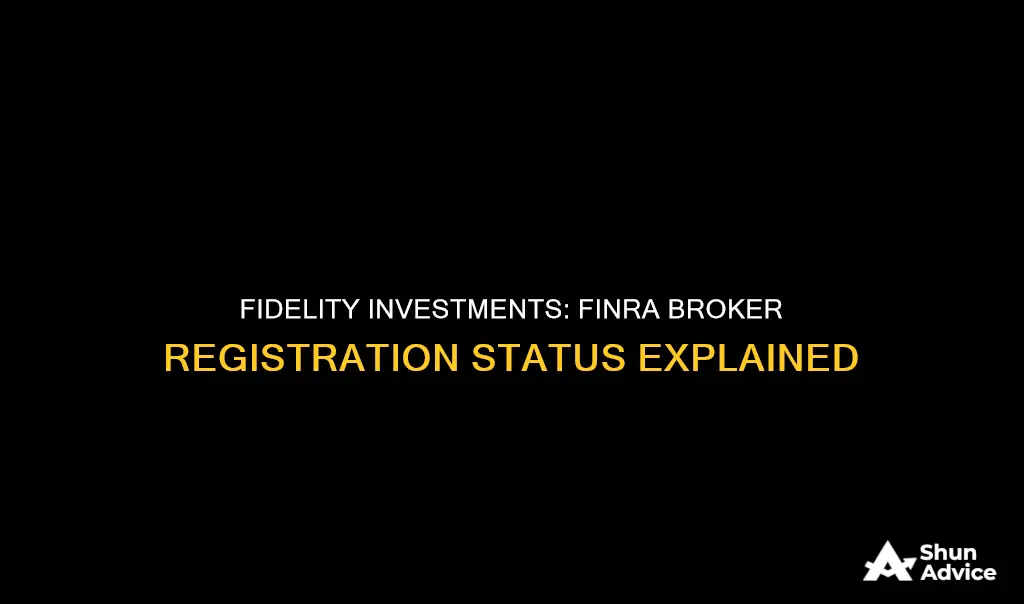
Fidelity Investments is a US-based multinational financial services corporation that offers an array of financial products, including brokerage services. Broker-dealer firms, such as Fidelity Brokerage Services LLC, are required to register with the Securities and Exchange Commission and be members of the Financial Industry Regulatory Authority (FINRA). FINRA is the largest independent regulator for securities firms in the US, and its BrokerCheck program allows investors to obtain information about the disciplinary records of any FINRA-registered broker or brokerage firm. While I cannot confirm if Fidelity Investments as a whole is a FINRA-registered broker, Fidelity Brokerage Services LLC is registered with the US Securities and Exchange Commission and is a member of FINRA.
| Characteristics | Values |
|---|---|
| Is Fidelity Investments a FINRA-registered broker? | Yes |
| Is Fidelity Brokerage Services LLC a FINRA-registered broker? | Yes |
| Is Fidelity Personal and Workplace Advisors LLC a FINRA-registered broker? | Yes |
What You'll Learn

Fidelity Brokerage Services LLC fined $1 million by FINRA
Fidelity Brokerage Services LLC, a unit of Fidelity, was fined $1 million by the Financial Industry Regulatory Authority (FINRA) for supervisory failures. The fine was imposed in January 2016 after the firm failed to detect or prevent the theft of over $1 million from nine customers, eight of whom were senior citizens, by a fraudster posing as a Fidelity broker.
Lisa Lewis, the perpetrator, pretended to be a Fidelity broker and convinced her victims to establish accounts at the firm, even setting up joint accounts where she was listed as an owner. She stole customer assets through various transfers and debit card transactions. Lewis pleaded guilty to wire fraud in June 2014 and was sentenced to 15 years in prison, along with being ordered to pay over $2 million in restitution to her victims.
FINRA discovered that Fidelity failed to adequately address multiple "red flags" related to Lewis's scheme. For instance, despite the victims being unrelated, their accounts shared common identifiers such as email addresses, physical addresses, or phone numbers, which tied them to Lewis. Additionally, Fidelity's customer-service call center received calls indicating that Lewis was impersonating or taking advantage of senior investors, but these red flags were overlooked.
Fidelity's inadequate supervisory systems and procedures were also cited as contributing to the failure to detect and prevent Lewis's fraudulent activities. While Fidelity maintained a report to identify common email addresses across multiple accounts, they failed to implement procedures for using the report effectively and allocate sufficient resources for its review and investigation. As a result, thousands of reports piled up, including one from March 2012, which showed that Lewis' email address was linked to numerous unrelated accounts. This report was only reviewed in April 2013, a year after it was generated.
In response to the matter, Fidelity neither admitted nor denied the charges but agreed to FINRA's findings. The fine served as a reminder to firms to ensure their supervisory systems are robust and capable of protecting senior investors from harm, with proper follow-up on potential red flags of fraudulent activity.
Maximizing 529 Plans: Fidelity's Investment Strategy Evolution
You may want to see also

Fidelity Investments' legal and regulatory disclosures
Fidelity Investments Legal and Regulatory Disclosures
Fidelity Investments is a registered broker-dealer and member of the Financial Industry Regulatory Authority (FINRA) and the Municipal Securities Rulemaking Board (MSRB). As such, it is subject to various legal and regulatory requirements, including those related to investor protection, disclosure, and ethical business practices.
One key regulatory disclosure is Regulation Best Interest (Reg BI), which requires broker-dealers to act in the best interests of their clients when making investment recommendations. This includes considering factors such as the client's financial situation, investment objectives, and risk tolerance.
Fidelity is also subject to the Securities and Exchange Commission's (SEC) rules and regulations, including those related to order routing and execution. For example, when routing customer orders for execution, Fidelity's clearing firm affiliate, National Financial Services (NFS), must consider factors such as the size of the order, trading characteristics of the security, and the opportunity for price improvement.
In addition, as a member of FINRA, Fidelity is required to provide clients with access to the BrokerCheck program, which allows investors to obtain background information on registered brokers and broker-dealer firms, including registration status, licensing, and disciplinary history.
Fidelity also makes various documents available to investors, such as the Customer Relationship Summaries (Form CRS), which disclose information about the relationships and services offered by the firm, including fees, costs, conflicts of interest, and standards of conduct.
Furthermore, Fidelity must comply with regulations related to electronic funds transfers (EFTs), tax withholding, and margin trading. For example, Fidelity provides specific disclosures about the risks associated with trading securities on margin, including the potential for losing more funds than deposited and the firm's ability to force the sale of securities in the client's account.
Fidelity is also subject to state-specific regulations, such as those related to tax withholding and "do-not-call" lists. For example, Nevada law requires Fidelity to notify Nevada residents of their right to be placed on the company's internal do-not-call list.
Overall, Fidelity Investments operates within a highly regulated industry, and the company is committed to complying with all applicable laws and regulations to protect investors and maintain the integrity of the financial markets.
Convince Your Family to Invest in Hedge Funds
You may want to see also

Broker-dealer firms and their registration
Broker-dealer firms are financial institutions that are licensed to buy and sell securities on behalf of clients (as brokers) and for their own accounts (as dealers). Broker-dealer firms must register with the Securities and Exchange Commission (SEC) and be members of the Financial Industry Regulatory Authority (FINRA).
The broker-dealer registration process covers the firm's full life cycle, from meeting initial membership standards to updating and renewing its registration. The process can take several months or up to a year, depending on the complexity of the application and the responsiveness of the regulatory authorities.
To become a registered broker-dealer in the United States, firms and individuals must comply with specific regulatory requirements, including:
- Exchange Act Registration: Section 15(a)(1) of the Exchange Act mandates that any broker or dealer using US interstate commerce to effect transactions or solicit the purchase or sale of securities must register with the SEC.
- Self-Regulatory Organization (SRO) Membership: In addition to SEC registration, broker-dealers must join an SRO. FINRA serves as the primary SRO for US broker-dealers.
- State Registration: Each US state and territory has its own registration requirements for individuals conducting securities business as broker-dealers or on behalf of broker-dealers within their jurisdiction.
- Associated Persons of Broker-Dealers: Certain "associated persons" of a broker-dealer, such as employees, must register as "representatives" and/or "principals" with FINRA and as "agents" or "salespersons" under state securities laws.
- Net Capital Requirements: Firms must meet the minimum net capital requirements set by the SEC and FINRA, which depend on the specific business.
- Written Supervisory Procedures (WSP): Broker-dealers must establish comprehensive Written Supervisory Procedures to ensure all activities comply with regulatory standards and are properly supervised.
- Anti-Money Laundering (AML) Program: Broker-dealers must implement an AML program that includes customer identification, transaction monitoring, and reporting of suspicious activities to prevent financial crimes.
- Business Continuity Plan (BCP): A BCP must be in place to ensure that critical business operations can continue during and after significant disruptions.
- Employee Trading Policy: A policy to regulate employees' personal trading activities is necessary to prevent conflicts of interest and ensure compliance with securities laws.
- Beneficiaries: Detailed information about all direct and indirect owners and beneficiaries must be disclosed to ensure transparency and compliance with regulatory requirements.
- Organizational Structure: The documentation of the organizational structure, including roles, responsibilities, and hierarchy, is required to support effective governance and regulatory compliance.
The registration process involves various application forms, membership interviews, and technology demonstrations. Firms must also designate a Chief Compliance Officer (CCO) and a Financial and Operations Principal (FINOP) to oversee compliance and financial matters, respectively.
Taxable Accounts: Choosing the Right Funds for Growth
You may want to see also

FINRA's BrokerCheck program
Broker-dealer firms are in the business of buying and selling securities, such as stocks, bonds, mutual funds, and other investment products, on behalf of their customers. These professionals are commonly referred to as brokers or stockbrokers, but their technical name is registered representatives. Broker-dealer firms must register with the Securities and Exchange Commission and be members of FINRA.
Registered representatives must also register with FINRA, pass a qualifying exam, and be licensed by their state securities regulator before doing business with customers.
FINRA's BrokerCheck is a free tool that provides background information on broker-dealer firms and their registered financial professionals. This includes registration, licensing, and disciplinary history.
A BrokerCheck report for an investment professional contains:
- A summary of the professional's background and credentials.
- A registration history, including a list of registered securities firms where the individual is or was registered.
- The individual's employment history for the last 10 years, both inside and outside the securities industry.
- A qualifications section listing the individual's current registrations or licenses.
- A disclosure section with information on customer disputes, disciplinary events, and certain criminal or financial matters on record.
A BrokerCheck report for a brokerage firm contains:
- A summary of the firm and its background.
- A firm profile describing where and when the firm was established, and listing controlling owners or influencers.
- A firm history detailing any mergers, acquisitions, or name changes.
- A firm operations section listing active licenses and registrations, business types, and operational details.
- A disclosures section with information on arbitration awards, disciplinary events, and financial matters on the firm's record.
Index Funds: Utopia or Dystopia for Investors?
You may want to see also

Fidelity's brokerage account services
Fidelity's full-featured brokerage account provides access to a range of resources to support your growth as an investor. This includes $0 commission trades, powerful research tools, and a wide range of investment choices. You can invest in stocks (domestic and international), ETFs, options, mutual funds, bonds and CDs, and precious metals.
Fidelity also provides free, independent research from over 20 providers to help you uncover opportunities, generate ideas, and analyse trends. Their single, accuracy-weighted score helps evaluate your stock picks, and you can set up customised alerts and watch lists.
In addition, Fidelity offers extended-hours trading, international investing in 25 markets and 16 currencies, and cash management tools for quicker access to your money. Their mobile trading applications allow you to stay connected and manage your portfolio anytime, anywhere.
For those new to investing or looking for more guidance, Fidelity provides access to experienced investment/trading consultants, over 150 Investor Centres, and a Learning Centre with training videos, articles, and expert opinions to build your investment knowledge.
GICs vs Mutual Funds: Where Should You Invest?
You may want to see also
Frequently asked questions
Fidelity Brokerage Services LLC is a FINRA-registered broker. Fidelity Investments is a US-based multinational financial services corporation that offers a wide range of financial products and services, including brokerage services through its subsidiary, Fidelity Brokerage Services LLC.
FINRA, the Financial Industry Regulatory Authority, is the largest independent regulator for securities firms doing business in the United States. It is dedicated to investor protection and market integrity through effective and efficient regulation and complementary compliance and technology-based services.
You can obtain background information on broker-dealer firms and their registered financial professionals, including registration, licensing, and disciplinary history, by using the FINRA BrokerCheck program. This information is available to the public free of charge through the FINRA website or by calling the BrokerCheck hotline.







